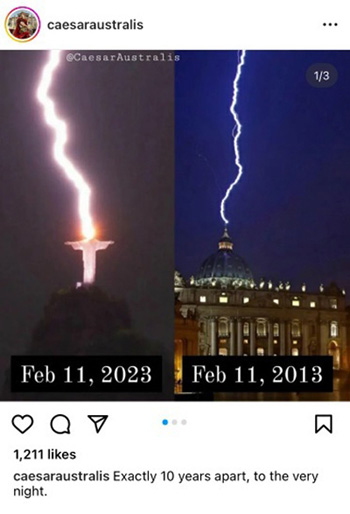What People are Commenting
Rescript, Lightning Bolts & Indians’ Rights
Symbolic Lightning Bolts
Dear TIA,
I saw this post on Instagram [below]. I think it is very symbolic. It shows the lightning bolts that fell over the Cross at the Vatican Basilica on the day Pope Benedict XVI abdicated the Papacy and another that struck the head of the statue of Christ the Redeemer in Rio de Janeiro. Both bolts struck on February 11 within an interval of ten years.
I wonder if there is a message in this coincidence.
Could you please enlighten me?
I.C.

TIA responds:
Dear I.C.,
Thank you for sending us these pictures.
It is truly a very singular coincidence. It is something to keep in our memory, but at this moment we cannot help you with an interpretation.
Cordially,
TIA correspondence desk
I saw this post on Instagram [below]. I think it is very symbolic. It shows the lightning bolts that fell over the Cross at the Vatican Basilica on the day Pope Benedict XVI abdicated the Papacy and another that struck the head of the statue of Christ the Redeemer in Rio de Janeiro. Both bolts struck on February 11 within an interval of ten years.
I wonder if there is a message in this coincidence.
Could you please enlighten me?
I.C.

______________________
TIA responds:
Dear I.C.,
Thank you for sending us these pictures.
It is truly a very singular coincidence. It is something to keep in our memory, but at this moment we cannot help you with an interpretation.
Cordially,
TIA correspondence desk
______________________
Pig Farming in China
Dear TIA,
This 26-story skyscraper in China is – you won’t believe it – a "mega farm" where pigs are raised for consumption. It is called a “vertical farm” and is supposedly more efficient.
This is, in my opinion, the opposite of the organic society you write about on your site.
It is just horrible for humans and pigs.
G.G.

This 26-story skyscraper in China is – you won’t believe it – a "mega farm" where pigs are raised for consumption. It is called a “vertical farm” and is supposedly more efficient.
This is, in my opinion, the opposite of the organic society you write about on your site.
It is just horrible for humans and pigs.
G.G.

______________________
Native Rights to Abandoned Lands
Dear TIA,
What is the correct opinion about Indigenous Land rights and Native Title? Whether it be South America, Australia or the United States.
Is it correct that, for example, Australia was terra nullius before the English arrived and colonized it? Aborigines never paid for the land in the way we do when we would like to buy a house and have to pay a mortgage.
What are their rights if any?
Thank you very much.
Sincerely,
P.F.
TIA responds:
Dear P.F.,
Without having the time to study this topic in depth, our opinion is that the natives Indians had the right to some expanse of land around their tribes, but not the right that is claimed by the Tribalist Movement today. Indeed, this movement pretends that the natives have the right to all the lands on the continent where they live.
We sustain that this pretension is absurd because:
Cordially,
TIA correspondence desk
What is the correct opinion about Indigenous Land rights and Native Title? Whether it be South America, Australia or the United States.
Is it correct that, for example, Australia was terra nullius before the English arrived and colonized it? Aborigines never paid for the land in the way we do when we would like to buy a house and have to pay a mortgage.
What are their rights if any?
Thank you very much.
Sincerely,
P.F.
______________________
TIA responds:
Dear P.F.,
Without having the time to study this topic in depth, our opinion is that the natives Indians had the right to some expanse of land around their tribes, but not the right that is claimed by the Tribalist Movement today. Indeed, this movement pretends that the natives have the right to all the lands on the continent where they live.
We sustain that this pretension is absurd because:
- By Natural Law a man has the right to take possession of abandoned lands that have no owner;
- His right over these lands is not unlimited, but is proportional to his needs;
- In the case of the native Indians of the Continents you mentioned, prior to the time of the Discovery – that is, before the 16th century – they did not even know that they were
on those Continents since they had no idea of geography. So, to pretend that now they have right over the entire continent where they lived is nonsensical;
- It is as nonsensical as to pretend that a man who fishes off the Western Coast of Africa in a place known only by him is the owner of the entire Atlantic Ocean;
- The fact that the native tribes fought among themselves for the possession of land demonstrates that they did not recognize any tribe as the owner of unlimited extensions of land.
- After those Continents were discovered by the English, Spanish and Portuguese, they brought to them Western Civilization with its Laws.
- The same right of property that is legitimate over abandoned lands favored those discoverers. That is, they had the right over the lands in proportion to their needs. So, the different nations that sponsored the expeditions of Discovery and established their colonies had a legitimate right over the abandoned lands of which they took possession;
- With time, the colonies of Western Civilization expanded and populated great parts of those Continents. This expansion in principle – without entering into particular cases – followed the laws of justice.
- According to Natural Law and Catholic Morals, it is just to recognize as belonging to the native Indians a proportional territory that can provide for their needs. They should be respected in their territory and should hold rights against those who would invade it. So, the politics of having Indian Reservations is fair.
- Today the native Indians of most Continents have been incorporated into Western Civilization in one way or another. Nonetheless, we believe that their right to the Reservations continues to be legitimate. If a particular group of native Indians as a whole decides otherwise – that is, if they decide to close their Reservation and distribute the lands among themselves – their
right to do so should also be respected.
Cordially,
TIA correspondence desk

Posted February 23, 2023
______________________
The opinions expressed in this section - What People Are Commenting - do not necessarily express those of TIA
______________________
______________________














Regarding the coming Apostolic Constitution regulating the use of the Traditional Latin Mass according to the 1962 Roman Missal that Pope Francis is editing, Card. Arthur Roche, Prefect of the Dicastery for Divine Worship and the Discipline of the Sacraments, issued an official document – a Rescript – that advances fundamental points of the coming papal document. A Rescript is a legally binding response given by a Pope to questions presented to him.
TIA offers to our readers our translation of this document from Italian to English as a contribution to understand what is coming. This document by Card. Roche was disseminated only yesterday in Italian although it is dated February 20, 2023. - TIA
Regarding the implementation of his Motu proprio Traditionis custodes of July 16, 2021, the Holy Father has confirmed what follows in the audience granted to the Cardinal Prefect of the Dicastery for Divine Worship and the Discipline of the Sacraments.
Dispensations specially reserved to the Apostolic See (cf. CIC, can 87 par 1) are:
- The use of parish churches or the erection of a personal parish for the celebration of the Eucharist using the Missale Romanum of 1962 (cf. Traditionis custodes art. 3 par 2);
- The granting of permission for the priests ordained after the publication of Motu proprio Traditionis custodes to celebrate with the Missale Romanum of 1962 (cf. Traditionis custodes art. 4);
- In the case mentioned above, the Dicastery for Divine Worship and the Discipline of the Sacraments exercises the authority of the Holy See, supervising the observance of the provisions of the Motu proprio Traditionis custodes, as established by art. 7.
- In the two cases mentioned above, whenever a Diocesan Bishop grants dispensations, he is obliged to inform the Dicastery for Divine Worship and the Discipline of the Sacraments, which will evaluate the individual cases.
Further, the Holy Father confirms – having already manifested his agreement in the audience of November 18, 2021 – what was established in the Responsa ad dubia [Response to doubts] with the annexed Explanatory Notes of December 4, 2021.The Holy Father has also ordered that this Rescript be published on L’Osservatore Romano and, afterwards in the official commentary of the Acta Apostolicae Sedis.
Vatican, February 20, 2023
Arthur Card. Roche,
Prefect of the Dicastery for Divine Worship and the Discipline of the Sacraments